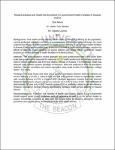| dc.description.abstract | Background: Poor health service delivery often results to immense suffering by the population, causing prolonged morbidity and death as a consequence. Using cross-sectional design, the study explored the effects of reward practices on health service delivery in government health facilities in Kwania District with the objectives; to examine the level of health service delivery, explore the effects of extrinsic reward practices on service delivery and access effects on intrinsic reward practices on service delivery in health facilities in Kwania District.
Methods: The study adopted a mixed approach and used questionnaire with a five-point likert scale type questions that measured the responses of 132 health workers and an interview guide was used to collect qualitative data from key district officials of Kwania. The theoretical model was deduced using rewards systems paradigm of literature. Data was analyzed in form of descriptive statistics, Pearson correlation and robust regression using strata version 15 (strataCorp, college station, TX, USA).
Findings: The study found that there was a positive correlation between extrinsic rewards and service delivery (r=0.126, p value>0.005) and that only intrinsic reward is significantly related with service delivery (r=0.26, p Value>0.005). Multiple regression showed that only intrinsic reward is significantly related with service delivery (β=0.169, P Value>0.00). The coefficient of determinants (R2 was only 0.062). rewards system (RS) is positively related to service delivery. However, increase in intrinsic rewards significantly increases health service delivery in Kwania District.
Recommendations: Therefore, the ministry of health and Kwania District Local Government should support career growth initiatives such as supporting its staff to go for further studies to acquire knowledge necessary to deal with the current trend of diseases, strengthen internal promotion and support career development needs of its health workers. | en_US |

